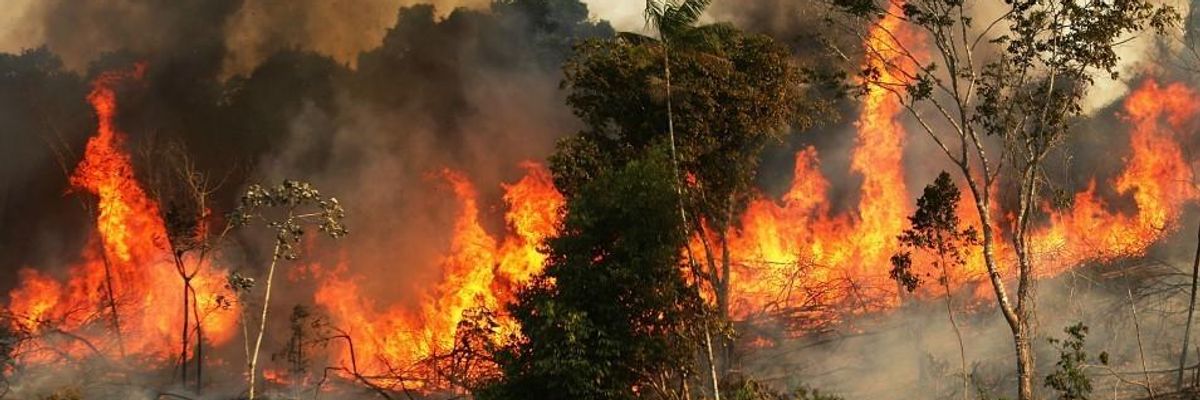New data out Monday from the Brazilian government showed that Amazon deforestation this year hit its highest level in over a decade, prompting environmental campaigners to warn the rainforest was approaching a possibly catastrophic "tipping point."
According to the figures from the Brazilian Space Research Institute (INPE), in the 12-month period ending July 30, 2019 deforestation claimed 3,769 square miles (9,762 square kilometers). That amount represents the highest rate of deforestation since 2008 and a nearly 30 percent increase from the previous 12-month period.
"These figures confirm what we feared, namely that 2019 has been a dark year for the rainforest in Brazil," said Oyvind Eggen, secretary-general of Rainforest Foundation Norway (RFN), calling the numbers "alarmingly high."
"We must remember that the Amazon has been undergoing deforestation for decades," Eggen added. "We are approaching a potential tipping point, where large parts of the forest will be so damaged that it collapses. A loss the size of what we've seen this year is terrible news."
Since the data set ends in July, the acreage doesn't capture losses from the end of the summer as fires--which observers have blamed on the deforestation-supporting policies of right-wing President Jair Bolsonaro--raged in Brazil and neighboring countries.
The effects of Bolsonaro's policies drew renewed ire from Cristiane Mazzetti, Greenpeace Brazil's Amazon Campaigner, who said Monday that the Brazilian president's "anti-environmental agenda favors those who practice environmental crimes, and encourages violence against forest people. His administration is trashing practically all the work that has been done in recent decades to protect the environment and end deforestation."
According to Kerry Cesareo, senior vice president of forests at World Wildlife fund, the news gives "a stark reminder that deforestation in the Brazilian Amazon has become out of control."
"The impacts of this devastation are far reaching," she said. "Deforestation at these levels is crushing the rich biodiversity of the region putting wildlife and plants at risk of extinction and jeopardizing communities and businesses that rely on the water and other natural resources from the forest."
"The Amazon is approaching a tipping point," Cesareo said, "in which it could transform into something more like a grassland savannah, causing serious consequences for the planet."
The government data was released days after an international team of scientists published research showing that deforestation in the Brazilian Amazon in July was almost four times the average from the previous three Julys. The number of fires in August was three times higher than in 2018 and were likely driven by deforestation, the researchers said.
"Our paper clearly shows that without tackling deforestation," said Dr. Erika Berenguer, a Brazilian researcher jointly with Lancaster University and the University of Oxford, "we will continue to see the largest rainforest in the world being turned to ashes."

